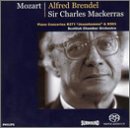| All Artists: Wolfgang Amadeus Mozart, Charles Mackerras, Scottish Chamber Orchestra, Alfred Brendel Title: "Mozart: Piano Concertos, K271 & K503 " Members Wishing: 0 Total Copies: 0 Label: Philips Release Date: 2/11/2003 Album Type: Hybrid SACD - DSD Genre: Classical Styles: Chamber Music, Forms & Genres, Concertos, Historical Periods, Classical (c.1770-1830), Instruments, Keyboard Number of Discs: 1 SwapaCD Credits: 1 UPC: 028947061625 |
Search - Wolfgang Amadeus Mozart, Charles Mackerras, Scottish Chamber Orchestra :: "Mozart: Piano Concertos, K271 & K503 "
 | Wolfgang Amadeus Mozart, Charles Mackerras, Scottish Chamber Orchestra "Mozart: Piano Concertos, K271 & K503 " Genre: Classical |
Larger Image |
CD Details |
CD ReviewsExcellent Mozart from Brendel and Mackerras Alexander Leach | Shipley, West Yorkshire United Kingdom | 06/08/2005 (5 out of 5 stars) "I really got this for the Concerto No 9 K271 which I have preferred over many later and more famous Mozart concerti. While Brendel's reading here doesn't replace my favourite performance (by Gulda on Orfeo), it is really excellent - in fact this SACD is enjoyable throughout, and given very fine sound.
The combined ages of the 2 principal artists must be about 150 years, and I think you can tell that from the performances - which is not to suggest at all that they are ponderous or overblown. It's more a question of style: the orchestral sound is rather fuller than I was expecting, but strikes a good balance between crispness of sound with fine woodwind presence, and avoidance of thinness in the strings. Mackerras' accompaniments reminded me rather of Karl Boehm's Mozart: full of wisdom and grandeur but without heaviness. The acoustic (the pretty large Usher Hall in Edinburgh) is generous, but the sound throughout is vivid and well focused, with the piano very well integrated into the aural picture. Generally this will appeal to listeners who like a traditional approach to Mozart piano concerti, but want to avoid too beefy an orchestral contribution. One tiny caveat is that I would perhaps have liked the timpani to be more present (perhaps played with harder sticks?) at various points, most noticeably in K503's opening ritornello - but they are clearly audible, and generally this SACD sounds first-rate. The `Jeunehomme' concerto (K271) typifies Brendel's approach: tempi are fairly orthodox (certainly not particularly slow), although his playing of the central Andantino is quite romantic - which is no bad thing when the playing of soloist and orchestra alike is so pleasing. Similarly he doesn't set off like an express train in the brilliant finale (Gulda and others are faster here), so overall the performance is thoroughly Mozartian and is generally relaxed. His choice of tempo (certainly not too slow) for the finale also means that the lovely slower minuet episode half way through follows on naturally - other performances, like Barenboim's on EMI, rather fall down here as the change in tempo and mood sound rather jarring. The performance of No 25 K503 is actually rather Beethovenian, which seems correct to me for this later work: the orchestral introduction is robust and Brendel's entry is similarly dramatic. Throughout this work the woodwind solos and string playing are really beautiful, and Brendel plays with an ideal combination of power and crisp elegance, especially in the finale. Sonically, this DSD recording is superb - as I have mentioned the acoustic is fairly spacious but the presence of the performers is excellent, with a generous soundstage and tangible depth to the image. I only listened in multichannel, and give this very high marks for the technical side of the recording. I can't recall a piano concerto recording where the solo instrument sounded as good as it does here. The performances are also excellent, so this SACD is very recommendable." |
